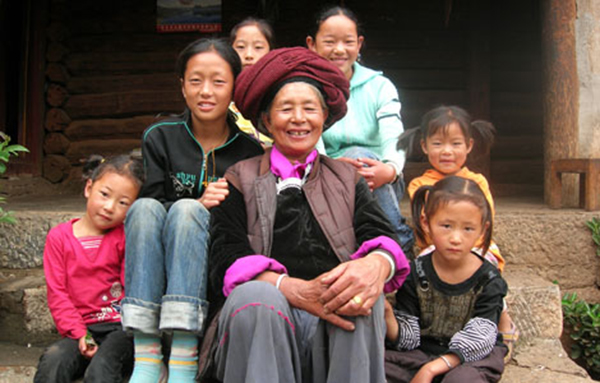In the Yunnan and Sichuan provinces of China lives a small ethnic group called the Mosuo. Among the Mosuo, romantic and family life are separated into different spheres by design. Children are usually raised in the home of their maternal grandmother with the help of their mother. She may maintain a long-term, monogamous romantic relationship with the father but, unlike in the West, this is considered separate from her role as a mother.
The role of the biological father is discretionary. There is no word in their language, in fact, for husband or father. A father is allowed, but not required to provide financial support and he is usually permitted to visit the mother and their child(ren) only at night. They call it “Axia” or “walking marriage.” The children’s primary male role models are usually their uncles, who remain under the authority of the children’s grandmother as they live under her roof.
A 78-year-old grandmother with her family (from Gender Across Borders):

From the Mosuo point of view, separating marriage from the raising of children ensures that the vagaries of romance do not disrupt the happiness and health of the child and its mother. Nor can the father wield power over the mother by threatening to withdraw from the marriage. Meanwhile, because the family of origin is never eclipsed by a procreative family, the Mosuo system reduces the likelihood that elders will be abandoned by their families when they need support in old age.
“Think about it,” writes an expert at Mosuo Project.
Divorce is a non-issue … there are no questions over child custody (the child belongs to the mother’s family), splitting of property (property is never shared), etc. If a parent dies, there is still a large extended family to provide care.
This way of organizing families is an excellent refutation of the hegemonic view that children need the biological father to live under their roof (and by implication, to be their patriarch). You can learn more about the Mosuo in the documentaries The Women’s Kingdom and The Mosuo Sisters.
This post originally appeared on Sociological Images, a Pacific Standard partner site, as “Separating Marriage From Childrearing: The Mosuo.”





